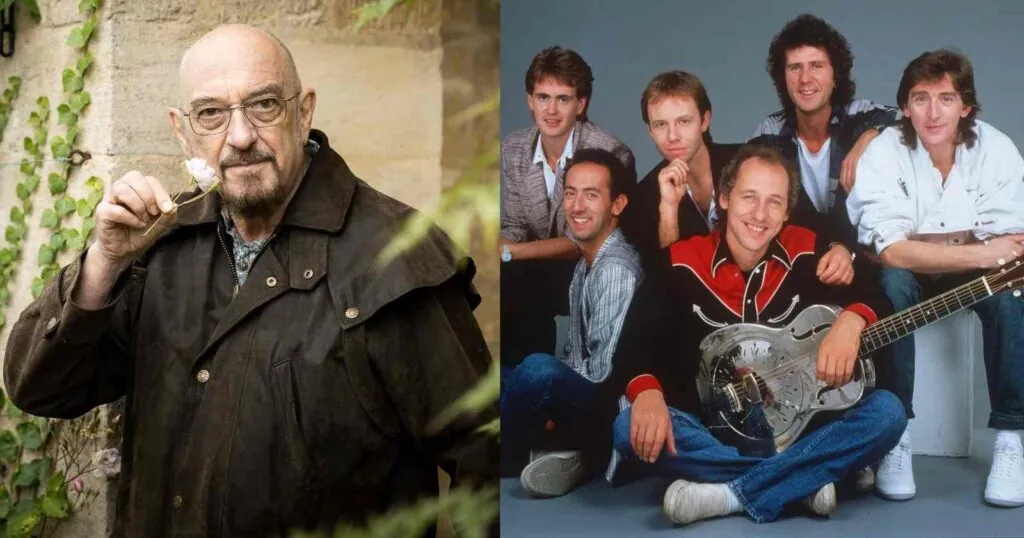Jethro Tull would have never been the same with the multi-instrumentalist, songwriter and vocalist Ian Anderson, who is the only one who was part of all the band’s releases. They became one of the most influential and successful Progressive Rock bands of all time and although their music was focused on this particular genre, Anderson has a really broad musical taste.
Over the years he talked about many other bands, including Dire Straits, the successful British group led by the guitarist, songwriter and vocalist Mark Knopfler.
Ian Anderson’s opinion on Dire Straits and Mark Knopfler
The Jethro Tull frontman is actually a big fan of Dire Straits and the group led by Mark Knopfler even influenced him. He even listed their album “Love Over Gold” (1982) as one of the records that changed his life.
“The quirky but controlled and percussive fingerpicking style of Mark Knopfler intrigued me from the first moment I heard ‘Sultans of Swing’ on a car radio while on tour in the U.S.A. I bought this album and greatly admired his controlled and spacious solos on ‘Telegraph Road.’ A man with musical discipline combined with the fiery flurry of youthful exuberance. Top guy!” Ian Anderson told Guitar World in 2025.
One of the most praised Dire Straits records, “Love Over Gold” is famous for the track mentioned by Ian. But also for “Industrial Disease” and “Private Investigations”. Besides Knopfler, at the time the group was formed by Hal Lindes (Guitars), John Illsley (Bass), Alan Clark (Keyboards) and Pick Withers (Drums).
The Jethro Tull album Ian Anderson said was inspired by Dire Straits
In 1987 Jethro Tull released the album “Crest of a Knave”, their sixteenth studio album. The record was influenced by Dire Straits as Ian Anderson told Paul Roland in 1989.
“The new album (“Rock Island – 1989) also has less of the Dire Straits influence which gave ‘Crest Of A Knave’ its contemporary sound. We were, in fact, heavily criticized for the Dire Straits flavour of the last album. Martin Barre and I consciously made an effort to avoid that kind of delivery on the new one. So Martin used less of the single coil pick up. I pitched the songs that bit higher and sang them more forcefully as I used to do. On ‘Knave’ I was trying to act out the songs a bit more. (Also) at the same time singing in a lower register and more quietly to save my vocal chords. Because I was worried about my ability to sing at that peak for two hours on stage night after night,” Ian Anderson said.
The musician also said that in the early 80s, Mark Knopfler asked Martin Barre’s guitar maker to make him guitars. He wanted them to sound like the ones used by the Jethro Tull guitar player.
“As far as the guitar sound is concerned, I know for a fact that in 1981 Mark Knopfler rang up Martin’s guitar maker. (He) ordered some new guitars. When asked what kind of sound he wanted, he said: ‘I want the sound that Martin Barre of Jethro Tull gets’. At that time Knopfler appeared to be playing an off-the-shelf Stratocaster with single coil pickups.”
Ian Anderson continued:
“Martin was playing Hamer’s with humbucking pickups and was just about to get some single coil Hamers. (They were) made with the five-way switch and out-of-phase position and all the things that are now associated with Knopfler. I mean, there’s only so many sounds you can get out of the electric guitar. If you’re playing the blues and it was on our bluesier tracks that it was most noticeable. Then you’re going to sound like Knopfler who made that sound his trademark.”
“Knopfler was using that old Hank Marvin sound, but beautifully and cleverly adapted to his own music. So he got away with it. It’s the same as when I came out with the breathy flute sound. (I was) singing through it and so on and made it my trademark. If you’d have been into jazz you’d have heard Roland Kirk doing much the same thing.”
“But I put it to a different backdrop and brought it to mass acceptance. At a certain time making it my trademark. (Also) making it impossible for anyone in a rock band to use the flute without being compared to Jethro Tull. You wouldn’t have to stand on one leg to get stick. You’d get it anyway just by virtue playing it within the context of rock music. I don’t like to throw things back at Knopfler, but wasn’t he the one who everyone originally said was trying to sound like Bob Dylan?”
Why Dire Straits broke-up
Dire Straits’ final concert happened in 1992 in Zaragoza, Spain. Three years later, in 1995, the band officially came to an end. The vocalist, guitarist and main songwriter Mark Knopfler decided to focus on his solo career. He felt that Straits’ had become too big and he wasn’t comfortable with all the fame that came with it.
Since then the group keeps getting big offers to reunite but it never happened. His friend and former bandmate John Illsey once talked about those propositions. “Every time we have lunch (he) says to me: ‘I wish people would stop offering me huge amounts of money to put (Dire Straits) back together’,” he told The Telegraph in 2023.

